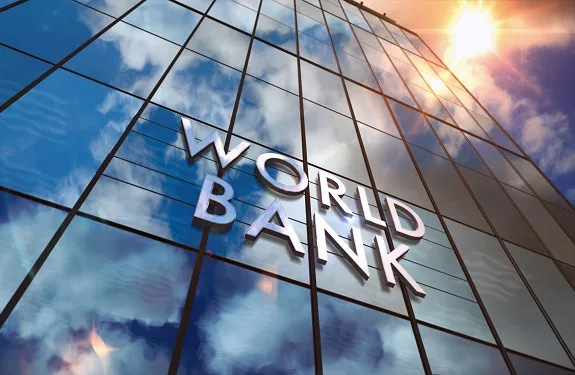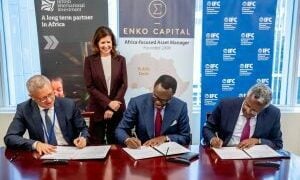The World Bank forecasts the Nigerian economy to grow by 2.8 percent in 2023, down from 3.3 percent in 2022 and further recover to 3 percent in 2024 and 2025.
In its Africa Pulse report April 2023 edition released last week, the World Bank said the Nigerian economic growth translates into growth per capita of 0.2 per cent in 2023 and 0.4 per cent in 2024 and 2025, which is insufficient to reduce extreme poverty in the country.
“Growth will continue to be driven by services, trade, construction, manufacturing, and agriculture. Oil production is projected to remain subdued in 2023, because of inefficiencies and insecurity, and recover slightly in 2024 and 2025,” the multilateral institution said.
On the global economy, the World Bank made a slight increase to its growth outlook for 2023, forecasting a two per cent growth for 2023 – up from a 1.7 per cent forecast in January.
This is as the International monetary fund has said its forecast for the Nigerian economy of 3.2 per cent in 2023 is one of the most stable despite the rising inflation in the country. This is as it maintained its recommendation of tightening monetary policies to tackle inflation.
Nigeria’s inflation rose to 21.91per cent in February this year even as the monetary policy makers continued a hawkish stance by further hiking benchmark interest rate in the country.
In the latest World Economic Outlook (WEO) which was launched yesterday, Nigeria’s growth projections was maintained at 3.2 per cent.
On the production side, the World Bank said growth in 2023 will be supported by industry with growth of 5.6 percent with the mega-refinery project.
In Nigeria, oil production picked up in late 2022, thanks to improved security that has so far prevented further oil theft, the World Bank said, adding that however, production remains below the OPEC+ quota.
The World Bank said Nigeria’s non-oil economic activity remained weak as the agriculture and industrial sectors experienced a rapid increase in the costs of energy and raw materials that were magnified by a weaker naira in the foreign exchange market.
“Nigeria, the largest African oil producer, is not expected to reach a current account surplus in 2022. The country’s higher crude oil export revenues are more than offset by higher imports of refined petroleum products, lower remittances, and lower capital inflows,” the World Bank said in the report.
The World Bank said Nigeria’s projected current account deficit will remain at an average of 0.3 percent of GDP in 2023 till 2025 as a result of declining prices and stagnant oil production.
The multilateral institution also noted that Nigeria, already the most populous country on the continent, will surpass the United States to be the third most populous country in the world.
“Mini-grid solutions can be efficient where governments are slow to expand the grid,” the World Bank said while citing Nigeria as an example. “In Nigeria, although the grid would be the most cost-effective solution for 80 percent of the population that has yet to access electricity, this would require adding 10 million people to the grid annually over 2022 till 2030.”
The World Bank says Nigeria has connected a maximum of 4.3 million people to the grid in a single year, “if 4.5 million people were connected to the grid per year between 2022 and 2030, then 60 percent of the people would have to access electricity through mini-grid systems.”
The World Bank said these solutions are also a better fit for purpose given that 95 percent of Nigerians without electricity access live in rural areas, where it may be difficult to achieve the necessary scale to deliver high-quality electricity access.
Speaking at the WEO press briefing at the ongoing 2023 Spring meetings of the IMF and World Bank in Washington DC, Division Chief, Research Department, Daniel Leigh said the forecast for Nigeria “is one of the most stable ones for this year.
“We have a slight increase, we have 3.3 per cent in 2022 that’s an upward revision, and for 2023 about the same 3.2 per cent and three per cent in 2024. This is an economy with very high inflation as well and this is why we have a forecast of about 20 per cent for 2023.
He also stressed the need for the Central Bank of Nigeria (CBN) to continue to tighten monetary policy rates noting that to rein inflation should be of utmost priority. “One of our main recommendations is to tighten the monetary policy to ensure that this inflation comes down towards the more target levels”, he stated.
On his part, the Chief Economist and Director Research Department IMF, Pierre-Olivier Gourinchas whilst speaking on the Sub-Saharan Africa region noted that inflation for the region is still high but he foresees a gradual decline for the region.
He noted that the economy is being affected by external factors and that the region is slated to have a slow growth in 2023. “This region is suffering from a strong funding squeeze we already discussed that some of the countries that are facing very innovative spreads, and a lot of them are already in the region.
“A lot of the challenges come from external factors that vary from the surge in energy prices and food prices as a consequence of the Russian invasion of Ukraine and the tension in energy markets is affecting the region. So we have a slow in growth for the region overall to about 3.6 per cent in 2023 and 3.9 per cent last year.
“We also have a situation where inflation is elevated, it’s double-digit inflation and is expected to come down from 16 per cent, to about 12.3 per cent, but still double-digit inflation. And of course, the very important challenge for the region is as a result of these elevated food prices, we have a large number of people who are in situations of food insecurity and we estimate about something like 430 million people in a situation with food insecurity.”
In his opening address at the 2023 World Bank/IMF spring meetings on Monday, David Malpass, president of World Bank, said despite the upward revision, the the pace of global growth would slow this year compared with 3.1 percent in 2022.
“Global growth is expected to be weak this year, slowing to 2% from 3.1% in 2022. For the U.S., we’re expecting a slowdown to 1.2% from 2.1% in 2022,” Malpass said.
“Several factors are weighing on the second half outlook: Oil prices have jumped back above $80/barrel. The recent banking sector stress dampens activity. And inflation pressures persist.
“The U.S. month-over-month core inflation has been rising over the last five months. There will be new data on Wednesday.”
The World Bank also predicted that the economic slowdown in developing countries would persist for years.
The bank said the slowdown would further increase debt distress for developing countries.
“If we look at developing countries excluding China, we expect a slowdown to about 3.1% in 2023 from 4.1% in 2022,” Malpass said.
“The concern in our recent reports is that slow growth will persist for years for many developing countries, increasing the fiscal stress and debt problems. It’s a combination of weak investment, higher interest rates, and relatively weak growth in the advanced economies.
“The danger is acute due to inflation, currency depreciation, rising debt service costs, and the collapse of international reserves.
“The diversion of natural gas to Europe presents grave obstacles to developing country production of electricity, fertilizer, and food.
“These problems are severely constraining future growth and deepening inequality and fragility for developing countries.
“I travelled to West Africa in March, where we are working to provide support in the face of these problems.”
Malpass said he had advocated a range of new policies that would spur production to combat inflation and currency weakness.
“But the likelihood is a long period of slow growth, asset reprising, and capital moving in the wrong direction — toward a narrow group of governments and big corporations rather than to the small businesses and working capital that could add to global growth,” he said.





